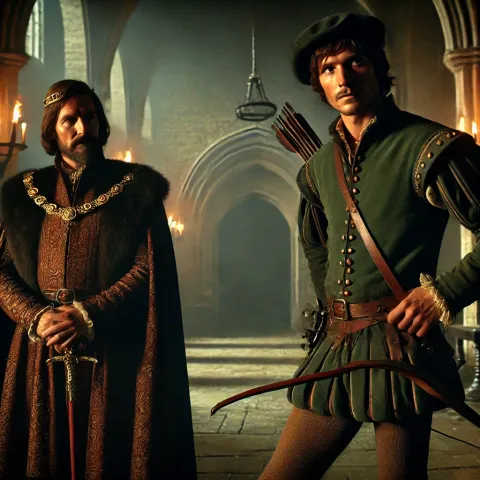
When, worn out and exhausted with his various exertions, however gratified with the result, Fitzurse, returning to the Castle of Ashby, met with De Bracy, who had exchanged his banqueting garments for a short green kirtle, with hose of the same cloth and colour, a leathern cap or head-piece, a short sword, a horn slung over his shoulder, a long bow in his hand, and a bundle of arrows stuck in his belt. Had Fitzurse met this figure in an outer apartment, he would have passed him without notice, as one of the yeomen of the guard; but finding him in the inner hall, he looked at him with more attention, and recognised the Norman knight in the dress of an English yeoman.
“What mummery is this, De Bracy?” said Fitzurse, somewhat angrily; “is this a time for Christmas gambols and quaint maskings, when the fate of our master, Prince John, is on the very verge of decision? Why hast thou not been, like me, among these heartless cravens, whom the very name of King Richard terrifies, as it is said to do the children of the Saracens?”
“I have been attending to mine own business,” answered De Bracy calmly, “as you, Fitzurse, have been minding yours.”
“I minding mine own business!” echoed Waldemar; “I have been engaged in that of Prince John, our joint patron.”
“As if thou hadst any other reason for that, Waldemar,” said De Bracy, “than the promotion of thine own individual interest? Come, Fitzurse, we know each other—ambition is thy pursuit, pleasure is mine, and they become our different ages. Of Prince John thou thinkest as I do; that he is too weak to be a determined monarch, too tyrannical to be an easy monarch, too insolent and presumptuous to be a popular monarch, and too fickle and timid to be long a monarch of any kind. But he is a monarch by whom Fitzurse and De Bracy hope to rise and thrive; and therefore you aid him with your policy, and I with the lances of my Free Companions.”